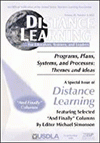
Distance Learning
Volume 20 #4
Edited by:
Michael Simonson, Nova Southeastern University
A volume in the series: Distance Learning Journal. Editor(s): Michael Simonson, Nova Southeastern University.
Published 2023
Distance Learning is for leaders, practitioners, and decision makers in the fields of distance learning, e-learning, telecommunications, and related areas. It is a professional journal with applicable information for those involved with providing instruction to all kinds of learners, of all ages, using telecommunications technologies of all types. Stories are written by practitioners for practitioners with the intent of providing usable information and ideas. Articles are accepted from authors--new and experienced--with interesting and important information about the effective practice of distance teaching and learning.
Distance Learning is published quarterly. Each issue includes eight to ten articles and three to four columns, including the highly regarded "And Finally..." column covering recent important issues in the field and written by Distance Learning editor, Michael Simonson.
This special edition of Distance Learning Magazine contains selected “And Finally...” columns from previously published issues.
CONTENTS

- EDU000000 - EDUCATION: General
- EDU041000 - EDUCATION: Distance & Online Education
- EDU037000 - EDUCATION: Research
-
 (Re)Envisioning Social Studies Education Research
Current Epistemological and Methodological Expansions, Deconstructions, and Creations
(Re)Envisioning Social Studies Education Research
Current Epistemological and Methodological Expansions, Deconstructions, and Creations
-
 Designing and Teaching Online Courses During Uncertain Times
A Special Issue of Distance Learning Ends and Means Columns, Distance Learning - Volume 17 #4
Designing and Teaching Online Courses During Uncertain Times
A Special Issue of Distance Learning Ends and Means Columns, Distance Learning - Volume 17 #4
-
 Distance Learning
Volume 20 #1
Distance Learning
Volume 20 #1
-
 Distance Learning
Volume 20 #3
Distance Learning
Volume 20 #3
-
 Distance Learning
Volume 19 #3
Distance Learning
Volume 19 #3
-
 Distance Learning
Volume 19 #4
Distance Learning
Volume 19 #4
-
 Qualitative Research With Diverse and Underserved Communities
Qualitative Research With Diverse and Underserved Communities

